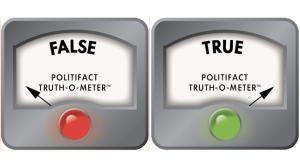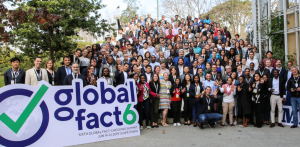The fashion for fact checking
“Whoever undertakes to set himself up as a judge in the field of Truth and Knowledge is shipwrecked by the laughter of the Gods”. – Albert Einstein, 1953
“If we are not able to ask sceptical questions, to interrogate those who tell us something is true, to be sceptical of those in authority, then we are up for grabs for the next charlatan, scientific, political or religious, who comes along.” Carl Sagan
“…one has to remember that the probable need not necessarily be the truth and the truth not always probable.” Sigmund Freud
“Fact” and “Truth” are abstract ideals that you can seek but never be certain to have achieved. To claim a piece of evidence as “fact”, or a conclusion as “truth”, is to assert infallibility and to proclaim all potential doubters as deniers, contrarians or heretics. The use of these words thus indicates a personal agenda: to persuade, to convince a doubter, to win an argument. “You have an opinion; they have some disputable evidence, but I – I am telling you THE FACTS: I am giving you THE TRUTH”.
The current proliferation of “fact” checkers on Social Media platforms, web sites such as politifact.com and factcheck.org, or on the Australian ABC, or the Australian Communicatons and Media Authority (ACMA), assume a god-like knowledge and ex-cathedra authority that never acknowledges, or is apparently even aware of, their own potential biases. The ABC for example offers a “fact” check TV program called Media Watch where a smug host offers weekly advice on who is telling the truth, and who is not.
Google, Facebook, the ABC, the Royal Melbourne Institute of Technology (RMIT), The Conversation along with many other media organisations worldwide (Fairfax, Washington Post, New York Times etc.), are clients of the International Fact Checking Network. IFCN is a division of a South Florida Journalism school called the Poynter Institute. As well as the IFCN, the Poynter Institute also operates the politifact.com and mediawise.com web sites.
These “fact” checkers mainly concern themselves with politics but also pronounce on hotly-debated areas of science and technology such as climate change, energy policy and (unsurprisingly, given the recent Covid crisis), epidemiology, vaccine effectiveness and virus treatments.
The Truth-O-Meter: a graphic used by the Poynter Institute to illustrate their opinion.
To take an example from just one area, the website factcheck.org has produced numerous posts over the past few years pronouncing on issues of Climate Change. Almost invariably these posts stamp the mainstream alarmist position with the labels “fact” or “true”. In many of these cases, the factcheck authors quote the “97%-of-scientists-agree” (see my post: the 97% solution) meme as the killer argument to support their position. However, no references are ever given, no analysis of the methodology of the surveys that produced this figure and no indication that the 97% number is hotly disputed by well credentialed scientists and is qualified even by the authors of the surveys from which it is drawn. The 97% factoid is simply a convenient prop, accepted as a truth by factcheck without discussion, and used to support their already established opinion.
Quis custodiet ipsos custodes?
Who are these self-appointed Custodians of Truth? Perhaps a panel of retired Judges experienced in impartial judgement and the sifting of conflicting evidence? Perhaps a range of scientists with appropriate knowledge of a subject and a lifetime of applying the Scientific Method? Perhaps a broad spectrum of randomly selected citizens impaneled to select between competing claims on the basis of life experience and common sense? Perhaps a military style adversarial blue team v red team approach? No, none of the above, but “journalists and media experts”. And not just any journalists out there in the real-world, filing copy for a living, but salaried academics teaching journalism in university media schools.
Facebook fact checking of complex and controversial technical or scientific subjects is undertaken for them by independent experts. Recent examples: Climate Change, Invermectin for Covid 19 treatment or the creation of that virus in a Wuhan Institute of Virology. But Facebook gets to choose the experts, and they choose experts whose opinions they favour with no requirement for balanced appraisal of all points of view.. The “independent experts” label is merely the eyewash for the opinions of woke Silicon Valley executives who run that Organisation.
..gatekeepers of MSM opinion..
Should we expect objectivity from journalists? Not according to Emeritus Professor Ted Glasser, current Head of the Department of Communications, Stanford University and for nineteen years head of their School of Journalism. In an August, 2020 interview with Zadie Winthrop of the University newspaper The Stanford Daily, Glasser is quoted:
“Reporters must embrace the role of social activists and it is hard to do that under the constraints of objectivity”
and, he continued, journalism should-
“free itself from this notion of objectivity to develop a sense of social justice”
on being later queried on these statements by campusreform.org, Glasser chose to double down:
“I reject your claim that journalism is supposed to be based on objective truth. I have no idea what you mean by objective truth”
Neither Glasser nor his interviewers explored the obvious question as to how a journalist who did not believe in objective truth could ever operate as a fact checker.
Professor Glasser’s view of the proper role of a journalism and his denial of even the possibility of objective truth is not confined to the United States. On March 31, 2021, Tito Ambyo, Senior Lecturer in Journalism at RMIT (Australia’s most prestigious school of journalism, and “fact checking” provider for Australia’s ABC network) tweeted:
“Good journalism IS activism. All the rest is sideshow” (quoted in The Australian, 03 May 2021)
If this is what is taught at Stanford and RMIT, then, at the very least, one would have to be cautious of any “fact” check carried out by the activists from these institutions, or indeed from any media school similarly affected by this corruption of the traditional journalistic ethos of unbiased, objective, evidence-based reporting (i.e those aspects of journalism that prominent media schools now appear to consider as too “hard”, a “sideshow”, and a hindrance to their proper role as social activists pushing personal agendas.
Wannabe Guardians of Fact and Custodians of Truth: participants at the International Fact Checking Network Summit, Cape Town 2019.
My objections the groups operating under the umbrella of the IFCN is not with their stated aims (which I assume are noble) or their conclusions (which I might or might not agree with) but in their use of the words “fact” and “truth” in order to award themselves the mantle of authority and infallibility. These words implies a value judgement and thus clearly indicate that their primary aim is to persuade, rather than merely inform. If the groups were called, and operated, as “evidence checkers” they arguably would have a useful role to play, provided they presented all the evidence, in a fair and balanced manner, with acknowledgement of all areas of uncertainty.
Evidence is not the same as fact, although the two ideas are often conflated. “Alternative evidence” is the basis of much legal argument and is the proper subject of scientific discourse. “Alternative fact” is an oxymoron.
“alternative evidence”… is the proper subject of much scientific discourse: “alternative fact” is an oxymoron.
The aim of an evidence checker should be to present information for readers to form their own judgement. This is not easy with the soi-disant fact checkers, where some of the information presented comes pre-labelled as “fact” and “truth”, and some as “false”, or even “pants on fire”(1).
Ideals for communicating evidence are set out in a timely November 2020 article in Nature, entitled: Five rules for evidence communication; strive to inform, not persuade. Read here (2).
Here are their five rules, with their commentary on each one:
1. Inform not persuade
“Conventional communication techniques might work when the aim is to change people’s beliefs or behaviors. But should that always be our aim?”
2. Offer balance, not false balance
“We can’t inform people fully if we don’t convey the balance of relevant information.”
“As soon as we are perceived to be ignoring or underplaying something our audience considers important, our motivations – and hence our trustworthiness – will be questioned.”
3. Disclose uncertainties
“Part of telling the story is talking about what we don’t know.”
4. State evidence quality
“Audiences also judge the credibility of information based on the quality of the underlying evidence more than its clarity, the usual criteria for a communications department.”
5. Inoculate against misinformation
“Many will worry that following these key principals – especially exposing complexities, uncertainties or unwelcome possibilities – will let “merchants of doubt” or bad actors warp their message. But there are other ways to guard against this.”
To the “five rules” set out above, I would add an important sixth:
6. Never call your evidence “fact”, or your conclusions “truth”.
*******
(1) Pants on fire is American rhyming slang: meaning LIAR!. From the childish playground taunt : “liar, liar, pants on fire!”. The reference is biblical. It is a label frequently applied by the Poynter Institute’s politifact.com and mediawise.com websites.
To say that you disagree with someone is to make a statement about your personal belief; to say that someone is wrong is to say that you have studied the evidence and come to a different conclusion; to call someone a liar is to attack their moral and ethical character.
In early 2020, when Dr. Li-Meng Yan – a virologist at the University of Hong Kong – said he had “solid scientific evidence” that the SARS-CoV-2 virus was man made, the anonymous Politifact journalists – in their capacity as self-appointed experts in everything - labelled him a liar. In May 2021, they quietly withdrew the label and acknowledged that he might have a point. But they offered no apology to Dr Yan for their year-long smear.
(2) Michael Blastland, Alexandra L. J. Freeman, Sander van der Linden, Theresa M. Martea & David Spiegelhalter: Nature November 2020 (587), 362-364 https://doi.org/10.1038/d41586-020-03189 https://www.nature.com/articles/d41586-020-03189-1

